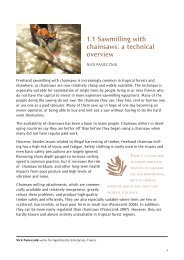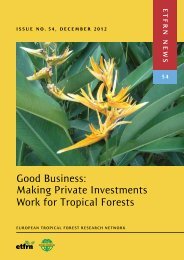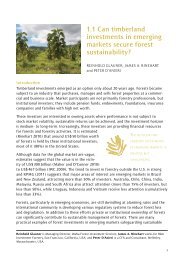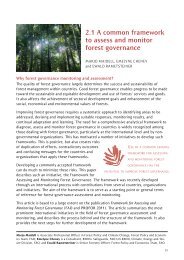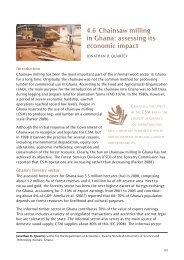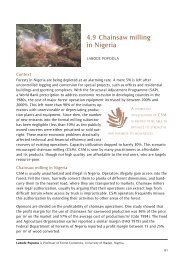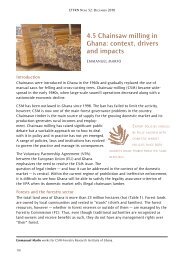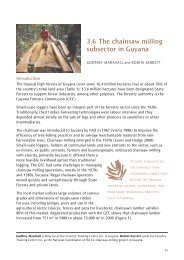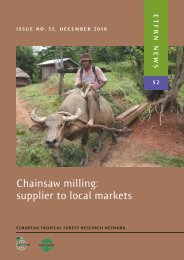Chainsaw milling: supplier to local markets - European Tropical ...
Chainsaw milling: supplier to local markets - European Tropical ...
Chainsaw milling: supplier to local markets - European Tropical ...
Create successful ePaper yourself
Turn your PDF publications into a flip-book with our unique Google optimized e-Paper software.
5.1 Developing timber<br />
legality regimes<br />
FREERK WIERSUM<br />
introduction<br />
since the 1980s much attention has been given <strong>to</strong> developing decentralized forest<br />
management systems in the form of social and community forestry. This development<br />
was based on the notion, that a dual forestry economy should be created, and that the<br />
development of the commercial forestry sec<strong>to</strong>r should be matched by efforts <strong>to</strong> develop<br />
forestry for rural development and provision of basic needs (wiersum 1999; arnold 2001).<br />
This notion was quickly accepted and resulted in the gradual development of a variety of<br />
decentralized forest management systems.<br />
small-scale, artisanal timber harvesting and<br />
There is a legal<br />
manufacturing systems also got attention within<br />
dualiTy beTween The<br />
this context (Forestry Department 1987;<br />
formal Timber secTor<br />
De la Cruz 1989).<br />
and The arTisanal<br />
<strong>Chainsaw</strong> <strong>milling</strong> (Csm) is a typical example of Timber secTor, buT This dualiTy is noT<br />
artisanal timber production. many people are<br />
usually recognized in Timber legaliTy<br />
involved in this system for providing timber <strong>to</strong><br />
programmes.<br />
<strong>local</strong> <strong>markets</strong>; they mostly operate under informal<br />
and location-specific arrangements. This is in strong contrast <strong>to</strong> the legal context of the<br />
formal timber sec<strong>to</strong>r. as a result of the recent international emphasis on timber legality,<br />
the legal duality between the formal timber sec<strong>to</strong>r and the artisanal timber sec<strong>to</strong>r is<br />
becoming more pronounced. whereas the formal timber sec<strong>to</strong>r has <strong>to</strong> comply with legal<br />
requirements, the artisanal timber sec<strong>to</strong>r mostly continues <strong>to</strong> operate under informal,<br />
and sometimes even illegal, arrangements. as a result, existing programmes <strong>to</strong> stimulate<br />
legality in the formal forestry sec<strong>to</strong>r may have negative consequences on artisanal timber<br />
production.<br />
changing forestry regimes<br />
Forestry regimes comprise the convergent principles, norms, rules, procedures and<br />
programmes that govern the interaction between people and forest resources (kant and<br />
berry 2001). Traditionally, a basic tenet of tropical forestry was that governments<br />
formulated the norms and rules and implemented the procedures for exploiting forests;<br />
the timber industry was responsible for timber exploitation and trade. Consequently, the<br />
Freerk wiersum works for the Forest and nature Conservation policy group, wageningen university.<br />
205



